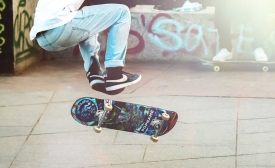skate diplomacy

Neftalie Williams discusses the cultural exchange that skateboarding brings to the international arena.
The next effort to defuse the nuclear brinksmanship over North Korea’s missile and bomb testing may come, not from diplomats, but from a pair of North Korean figure skaters who perform to music by the Beatles. An obscure competition on Thursday and Friday here in Bavaria has gained geopolitical urgency as the pairs team of Ryom Tae-ok and Kim Ju-sik seek to become the first North Korean athletes to qualify for the 2018 Winter Olympics in February in Pyeongchang, South Korea.
Cultural exchange between skaters in the U.S. and other countries can help improve relations between nations from the bottom up, according to Neftalie Williams, Cuba Skate’s Chair and Research Director at USC Annenberg’s Institute of Sports, Media and Society. Williams compared the potential of skate diplomacy with the role that ping-pong played in restoring U.S.-Chinese relations in the early 1970’s.
Like listening to rock music in the 1960s, interest in such a uniquely American import marked the young skaters as socially suspicious, and sometimes for rough treatment by police and arrest, though their experiences were perhaps not all that different from confrontations between U.S. skaters and civic authorities concerned about the destruction of public property.







